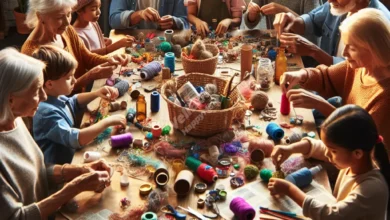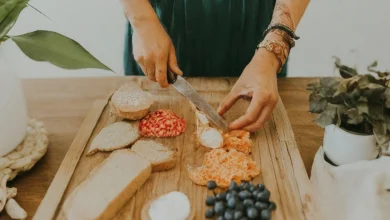Hand to Mouth: Zero Waste Cooking from Scratch

In a world where food waste is a pressing issue, learning how to cook from scratch and minimize waste can have a significant impact, both environmentally and economically. Hand to Mouth: Zero Waste Cooking from Scratch is not just about reducing waste but also about embracing a sustainable lifestyle that promotes creativity in the kitchen. This approach encourages individuals to be mindful of their food consumption and make the most out of every ingredient they use.
Benefits of Zero Waste Cooking
Zero waste cooking offers numerous benefits beyond just reducing waste. By cooking from scratch and using up ingredients efficiently, individuals can save money, eat healthier, and even discover new flavor combinations. This approach encourages resourcefulness and creativity in the kitchen, making cooking a more enjoyable and fulfilling experience.
Essential Tips for Zero Waste Cooking
To excel in zero waste cooking, it’s essential to plan your meals carefully, use up leftovers creatively, and make the most out of every ingredient. Here are some tips to help you get started:
- Plan your meals in advance: Create a weekly meal plan to ensure you only buy what you need.
- Use up leftovers: Repurpose leftover ingredients into new dishes to minimize waste.
Zero Waste Kitchen Staples
Creating a pantry stocked with zero waste essentials is key to successful zero waste cooking. Here is a table outlining some staple items you should have in your zero waste kitchen:
| Item | Purpose |
|---|---|
| Bulk grains | Versatile base for many dishes |
| Beans and legumes | Protein-rich and filling |
| Seasonal produce | Fresh ingredients for varied meals |
| Herbs and spices | Flavor enhancers for dishes |
| Mason jars | Storage for bulk items and leftovers |
Zero Waste Recipes to Try
Experimenting with zero waste recipes can open up a world of delicious possibilities. Here are two simple, zero waste recipes to get you started:
- Zero Waste Vegetable Stir-Fry
- Ingredients:
- Mixed vegetables (e.g., bell peppers, broccoli, carrots)
- Soy sauce
- Garlic
- Rice (leftover or freshly cooked)
- Instructions:
- Heat oil in a pan and sauté garlic.
- Add chopped vegetables and stir-fry until tender.
- Add cooked rice and soy sauce, stir well, and serve hot.
- Ingredients:
- Banana Peel Bacon
- Ingredients:
- Banana peels
- Soy sauce
- Smoked paprika
- Maple syrup
- Instructions:
- Marinate banana peels in soy sauce, smoked paprika, and maple syrup.
- Bake in the oven until crispy and enjoy as a bacon alternative.
- Ingredients:
Tools for Zero Waste Cooking
Equipping your kitchen with the right tools can make zero waste cooking easier and more efficient. Some essential tools to consider include:
- Reusable containers: For storing leftovers and bulk items.
- Beeswax wraps: To cover bowls and wrap food instead of using plastic wrap.
- Compost bin: For collecting food scraps to be composted.
Zero Waste Grocery Shopping Tips
When shopping for ingredients, adopting zero waste practices can help reduce packaging waste. Here are some tips for zero waste grocery shopping:
- Bring your own bags and containers: Avoid single-use plastic bags and containers.
- Shop in bulk: Purchase items like grains, nuts, and spices in bulk to reduce packaging waste.
Benefits of Composting
Composting is a valuable practice that complements zero waste cooking by diverting food scraps from landfills and creating nutrient-rich soil for gardening. Some benefits of composting include:
- Reducing methane emissions: Food waste in landfills produces methane, a potent greenhouse gas.
- Enriching soil: Compost adds essential nutrients to soil, promoting plant growth and health.
Common Challenges of Zero Waste Cooking
While zero waste cooking is rewarding, it also comes with its challenges. Some common obstacles include:
- Time constraints: Cooking from scratch and managing food waste requires time and planning.
- Limited access to bulk stores: Not all areas have easy access to bulk stores for zero waste shopping.
Zero Waste Cooking for Beginners
If you’re new to zero waste cooking, starting small and gradually incorporating zero waste practices into your routine can make the transition smoother. Here are some beginner-friendly tips:
- Start with one meal: Choose one meal a week to cook from scratch and gradually increase as you become more comfortable.
- Focus on pantry staples: Build a collection of versatile pantry staples to create a variety of dishes.
Embracing a Zero Waste Lifestyle
Zero waste cooking is not just about what happens in the kitchen; it’s a mindset that extends to all aspects of life. Embracing a zero waste lifestyle involves being mindful of consumption, reducing waste in all areas, and making sustainable choices daily. By adopting this holistic approach, individuals can contribute to a more sustainable future for our planet.
FAQ
What does zero waste cooking entail?
Zero waste cooking involves minimizing food waste by cooking from scratch, using up ingredients efficiently, and adopting sustainable practices in the kitchen.
How can I transition to zero waste cooking?
Transitioning to zero waste cooking can be done gradually by starting with small changes, such as meal planning, using up leftovers creatively, and reducing single-use plastics in the kitchen.
Key Takeaways
- Zero waste cooking promotes sustainability by reducing food waste and embracing a mindful approach to cooking.
- Planning meals, utilizing leftovers, stocking zero waste kitchen staples, and using the right tools are essential for successful zero waste cooking.
- Embracing a zero waste lifestyle involves making conscious choices to minimize waste in all aspects of life.



